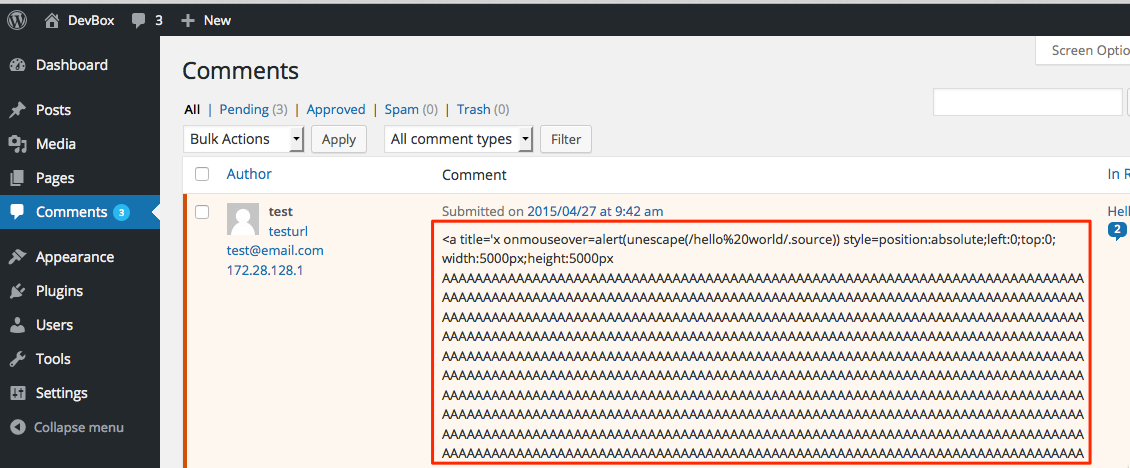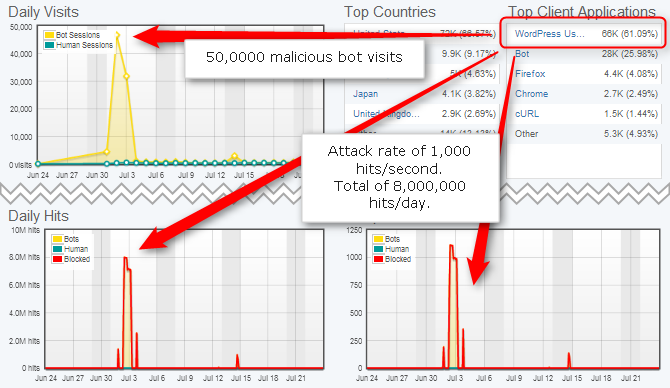WordPress is known to be the most popular Content Management System (CMS) in the world, which also makes it a popular target for hackers as well. While most of the WordPress hacking cases seem like random attacks, but in reality, every website has something to offer them. The correct idea of the result also relies upon the intentions of the hackers.
How popular is WordPress exactly?
WordPress is a free CMS, based on PHP and MySQL. It’s used by more than 60 million websites, which include 30.6% of the top 10 million websites as of this year. WordPress has achieved its enormous popularity by being free for everyone. Anyone with a basic HTML or CSS knowledge can build and manage a site using WordPress. It offers various SEO plugins and themes which help improve the search engine visibility of a website. With the clever use of plugins and a huge number of built-in features, it has quickly developed beyond its expectations.
People use WordPress for every kind of website these days, including e-commerce, photography portfolio, or even for a simple blog site. 714 new WordPress sites are being created every day, making it the fastest growing CMS in the world. But the sort of popularity WordPress has, it comes with a target behind its back, which explains why hackers would choose to target WP more than any other CMS.
But the real question is, what do they exactly achieve from hacking WP sites?

Reasons why hackers prefer to attack WordPress sites
Hackers don’t just rip off big corporations; they are always looking for any vulnerability they can find and exploit them. The term “WordPress hacking” is very common in the Black-hat hackers community. Here are some of the reasons why hackers target WordPress sites a lot.
XSS

Also known as Cross-Site Scripting, hackers like to inject malicious content or code onto the front end of a WordPress site, hoping that someone would click on the errant links. This hack can also happen through comment spam or by hacking the site’s email and sending the visitors spam messages. Having good firewall security can prevent hackers from performing XSS on a WordPress site. The benefits of using a firewall and backup plugins are unimaginable in this situation.
Stealing Information

Any security breach is harmful to business, but this particular WordPress hacking attack can harm not just the visitors, but also the reputation of the brand. Hackers can use this info in various ways and do a lot of things with it, such as creating fake IDs, take loans from banks, apply for prescribed drugs, get credit cards using someone else’s identity, blackmailing, misguiding, and what not.
Every organization works hard to keep insights about their company, especially by financials and client account details under wraps. Hackers can use such information to send fake requests to the targeted website’s server, causing harm to the site owner and the website itself. So it’s better not to sync that information to the corresponding business site or at least store it in a separate instance.
Overload The Web Server

Hackers overload a web server with an influx of hits, also known as Distributed Denial of Service (DDoS) attack. The security of a WordPress website is strong for the most part, but once the hackers hit the server response threshold, the site goes down. But why would they do this?
Hackers perform a DDoS attack on WordPress sites for many reasons. They either want to crash the site down for a while, or they can have a personal vendetta against the owner of the site. They can also do it to demand a ransom.
Stealing the Server Bandwidth

Hackers can turn a WordPress site into a hosting ground for other websites traffic through hotlinking the images on the site. Hackers can also steal server resources to host their illegal activities, such as mining bitcoin(that’s actually a different type of attack) and brute force attacks on other sites. Utilizing a CDN with Hotlink Protection or disabling the right-click in WordPress can prevent hotlinking.
Storing Illegal Files
Sometimes hackers use a website disk space to store a huge number of files like mp3 videos, pirated movies, etc. This particular hack takes up a lot of the website disk space. So whenever the hackers choose to run these files on the server, it will most likely bog down the site. When web hosts come to know about it, they suspend the hacked site, and Google adds the site to its blacklists. It causes the site owner to lose traffic on his website, and his reputation faces a setback.
For Reputation
Black-hat hackers who want to belong in the hacking community are of two types – experienced hackers and script kiddies. The script kiddies don’t usually hack WordPress sites with any malicious intentions. They want to get recognized and be praised by their peer. Experienced hackers do so because that will enable them to get paid well for their work. If it’s a popular, well-known WordPress website, or if the hackers had to bypass some extraordinary security barrier, they would gain respect and reputation in their community, hence the continuous attack on WordPress sites.
Vandalizing Website
Last but not the least, there’s website vandalism in WordPress hacking innuendos. Hackers are doing this to build up a calling card for themselves while hurting the website brand at the same time. One of such disfigurements happened to a large group of WordPress websites and continued happening even after WordPress released the patch because a lot of users failed to update on time.
Conclusion
WordPress is not invincible, but there are still ways to put up a good defence against hackers by examining the website and searching for loopholes. Backing up the site regularly, securing the website and its passwords, using security plugins, a CDN, an SSL certificate, and running regular vulnerability scans can help a WordPress website have fewer vulnerabilities in it. In short, every website owner must plan for the worst to come. That way, the situation would be much easier to handle.
Leave a Reply